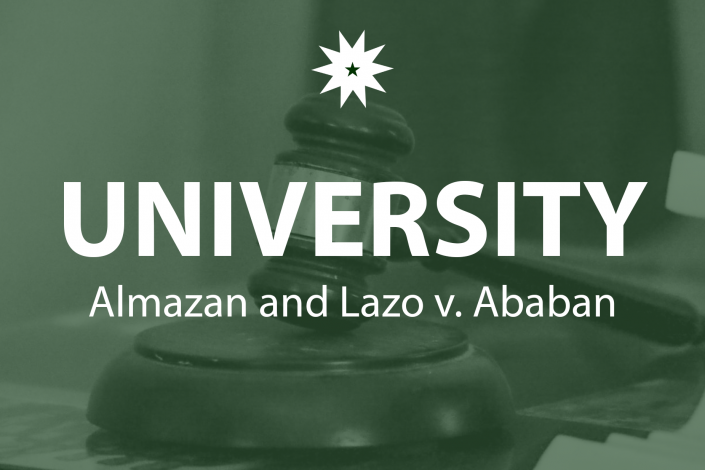
Magistrates of the Judiciary Branch questioned in depth the legal arguments presented by the petitioners of a case against the DLSU Commission of Elections (Comelec) during the first session of oral arguments held last March 9.
The case was brought to the Court by Calvin Almazan and Ma. Bianca Lazo, members of Alyansang Tapat sa Lasallista, after Comelec deemed them as “incompletely filed” and were thus not allowed to run for BLAZE2022 Batch President and Legislative Assembly Representative, respectively.
A ‘violation’ of due process
In the speech making her case, Lunette Nuñez, legal counsel of the petitioners, argued that prior to Comelec’s issuance of an initial decision, an “initial hearing of any sort” must be observed. She claimed that Comelec committed a gross misapprehension of facts when it considered a January 18 meeting between the commission and Tapat as an official appeal “when it was only a clarification of the status and finality of Almazan and Lazo’s candidacy.”
Magistrate Jericho Quiro was quick to question Nuñez, asking her to cite where it is stated in the jurisprudence how decisions on cases like this should be made, to which she responded that no such principle exists in writing. “There’s no writing of it. So how can you say they violated the law?” Quiro queried.
Nuñez reasoned that even though it is not in writing, Comelec follows “procedural due process”. Quiro told her she did not need to expound.
Interpellated by Deputy Chief Magistrate Andre Miranda, Nuñez said that Almazan and Lazo’s case qualifies as an electoral proceeding. Having established that the requisites for such proceedings were already met, Miranda then questioned the petitioners’ counsel on whether Comelec’s handling of the case satisfied the standard set by the USG Constitution. Nuñez’ response was that the poll body had no jurisdiction over the matter, but she was later made to concede that they did.
Reasoning that the Court should accord respect and finality to the factual findings of quasi-judicial bodies like Comelec, Miranda further asked, “If the same (Comelec’s findings) were obtained through substantial evidence, why should we revisit the factual findings of Comelec?”
“Your honor, because they decided on whims because of the fact that they considered an initial hearing, which was nonexistent,” Nuñez answered. But Miranda repeated the question, reiterating that procedural requisites were met, as they already established. The counsel, in response, instead said that Comelec considered irrelevant evidence. She, however, also earlier acknowledged that Comelec did have enough evidence to constitute substantial evidence.
Failure to notify
Nuñez also brought attention to Comelec’s alleged negligence in notifying Almazan and Lazo of the missing documents. She revealed that Comelec had two meetings with Tapat, yet the former “failed to inform them (Tapat) regarding the missing cover letters.” She added that 14 hours elapsed after the petitioners submitted their documents on January 15 before Comelec issued the said notice. This, she said, was “mere negligence”.
Quiro, however, lectured the petitioners over this fact. Citing the memorandum of agreement (MOA) between the commission and the political parties for the election, he noted that a party had the right to follow-up Comelec if they had not received an acknowledgment receipt for the submission of documents. But Tapat made no such follow-up.
“In fact, there were two responsibilities on your part here, ‘di ba? You shall inform Comelec, and if they do not respond, you can follow up,” he countered.
The magistrate went on, saying that the petitioners failed to fulfill two of their responsibilities, yet they are only faulting Comelec for the provision requiring the commission to send an acknowledgment receipt. “Is that fair?” he asked.
“No, your honor,” Nuñez replied.
Incomplete submission
Chief among Nuñez’ other arguments was that the purpose of the cover letter was complied with “but not in form”. She reasoned that the information found in the letter could also be found in other submitted documents.
Quiro, however, referred to the MOA which listed the cover letter as a separate requirement despite Nuñez’s assertion that it was merely supplementary.
Additionally, Magistrate Reginald Bayeta IV criticized the submission itself for its lacking requirements. In response, Nuñez floated the possibility of “mishaps and maybe technical difficulties” without providing further explanation.
Access to submission folder
The counsel also pointed to force majeure, or unforeseeable circumstances that prevent one from complying with a contract. Such a circumstance, she said, was what prevented Tapat’s Certificate of Candidacy (COC) Representative from submitting on time due to a medical emergency. She asserted that it was unavoidable for the representative to go to the hospital on the day the requirements were to be passed. She also claimed that poor internet connection in the hospital prevented the representative from submitting the requirements.
Quiro asked who had access to the submission drive. Nuñez stated other people had access to it as well but maintained that there is no evidence of who had access to the particular folder outside of the COC Representative. “ We don’t know. Maybe in the COB (College of Business) drive of Tapat, only [the COC Representative] Ms. Centeno has access [to] that drive.”
This contradicted a list, submitted by Comelec, showing who had access to the submission drive. When confronted with the evidence and with Quiro suggesting that anyone could have submitted the documents, Nuñez cast doubt on the validity of the evidence saying that “it does not stand at all” but also yielded that her side was unable to submit evidence that could defeat Comelec’s.
A second session will be held on March 10 at 9:30 pm, where Comelec’s counsel is expected to present their arguments. The decision hearing is scheduled for March 12 at 6 pm.
